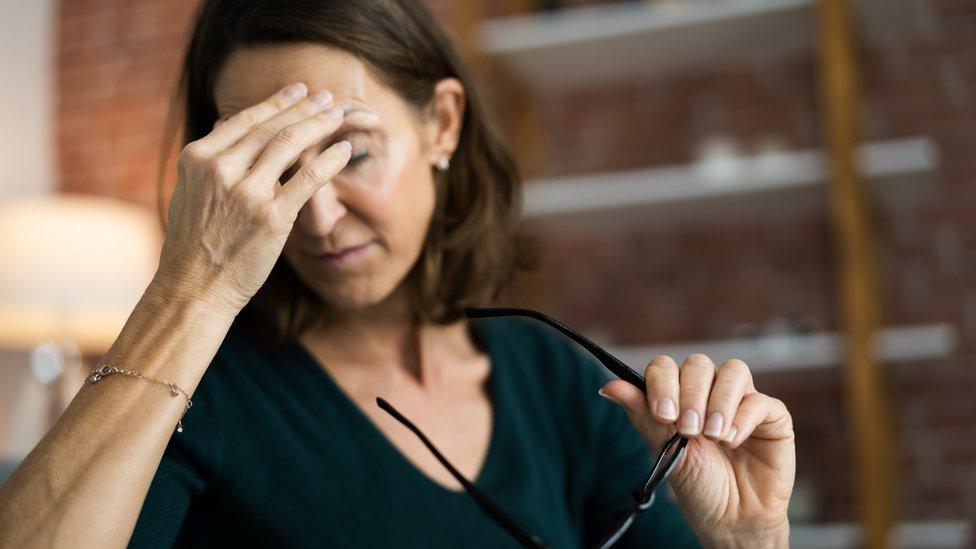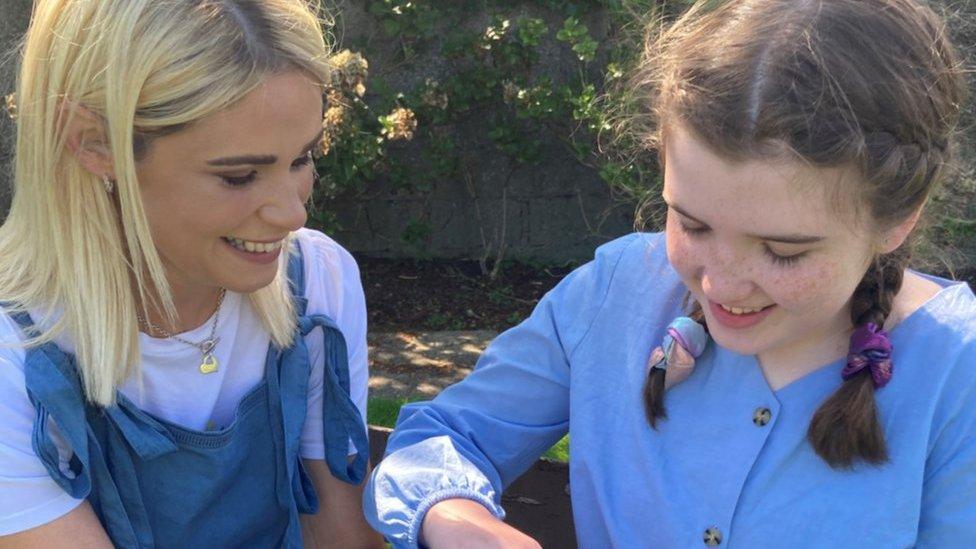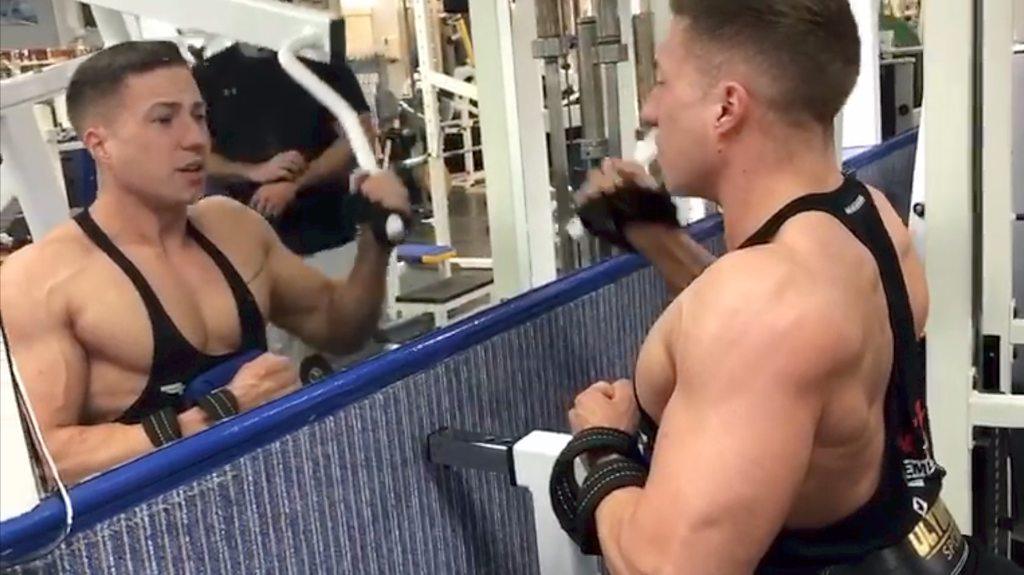From chronic illness to bodybuilding success
- Published

Rosie Bailey (centre right) was determined to exercise and credits it with helping manage her condition
A female bodybuilder has said becoming "the boss" of her body has helped manage her chronic illness.
Rosie Bailey began experiencing chronic fatigue at the age of 14 and struggled to get out of bed and climb the stairs.
The 21-year-old had her third bowel operation last year after her bowel wall collapsed.
She said: "Chronic illness is a part of me and it would be very easy to let it take over my life, but to me that's not a life worth living."
Miss Bailey, from Bristol, was diagnosed with postural tachycardia syndrome (PoTS) in 2016 then later Ehlers-Danlos syndromes (EDS).
As a result, she experiences extreme dizziness, hypermobility, joint pain, physical discomfort and irregular periods.
She said the combination of symptoms was "tough [as] when I'm in a flare-up everything flares - they're very linked".
Reluctant to follow medical advice "to do less", she started seeing a personal trainer once a week for a gentle session.

She got into bodybuilding after her trainer joked about entering a bikini competition
She said: "I had to gradually train my body just to walk a short distance then over time built that up to a run.
"The training gave me a lot of hope and strength to keep pushing and gave me something to look forward to every week."
Soon after, a joke with her trainer about entering a bikini competition - a category in women's bodybuilding - became reality and she competed in the United Kingdom Drug Free Bodybuilding Association's junior class.
The fitness coach said: "I threw myself into a posing workshop and fell in love with it.
"I fell in love with the routine and structure it provided and the mental release it gives me."
'Push the extremes'
As the only competitor, she won the class then went on to take third place in the open event.
She said pushing the extremes with bodybuilding feels "almost like proving to myself I can do things".
"I still struggle and get frustrated but I've learned when my body's not into it and sometimes I have to take big rest periods, so progress doesn't just happen overnight," she said.
"I can wake up and I've popped my shoulder out which is uncomfortable but [with the better body conditioning] I can roll it back in."

She has had three bowel operations due to a weakened bowel wall caused by hypermobility
An estimated 0.2% of the UK population is affected by PoTS, a disorder of the autonomic nervous system which sees sufferers typically have a persistent increase in heart rate over 30 beats per minute.
It had a big impact on Miss Bailey's life when she was at school.
Recalling her teenage years, she said: "Just before I turned 14, I had a stomach bug which I never really felt like I recovered from and the fatigue just got worse.
"Getting out of bed felt like a challenge, which for someone who was playing hockey seven times a week and always busy… you start to almost question your own sanity."
'Constant battle'
She took four months off and did not return full time.
"The exhaustion was a constant battle but I felt like I was almost making it up… as it wasn't understood," she said.
"I'd go to school for an hour or two then go home and crash, and people never saw the crash."
As her symptoms worsened around her period, within a year she was diagnosed with polycystic ovary syndrome.
"I was incredibly low for a long time," she added.

Miss Bailey became a personal trainer after dropping out of school
At one point she thought she would never be able to work full time and gave up her ambition to go to university to study bio-chemistry when she dropped out of school aged 17.
Instead, Miss Bailey became a personal trainer and said the physical training helped her feel like she had "regained some control".
Her experience with chronic illness has actually helped her in her job.
She said: "I have a number of clients with similar chronic illnesses and I'm able to relate to them a lot more as I understand the ups and downs and the mental side, which is probably the biggest challenge."

She said her condition effects her "every single day but I don't let it stop me"
Miss Bailey was told she had PoTS after two-and-a-half years of symptoms but it usually takes seven years to get a diagnosis.
Professor Lesley Kavi, chairman and managing trustee of PoTS UK, said: "As PoTS is an invisible disease, healthcare professionals, colleagues, family and friends often do not appreciate the severity of the illness and the limitations it can impose… that affects daily living, jobs or education.
"Half of patients are told that it's all in their head before they get a PoTS diagnosis."
Professor Kavi said what applies to one person does not apply to all.
Explaining the benefits of exercise, she said: "When your skeletal muscles in your calf, thighs and buttocks are contracting, they help to pump blood around the body.
"Keeping these muscles as strong as possible with exercise in a horizontal position is one of several strategies that can improve symptoms."

She loves "every second" of competing in bodybuilding events
Miss Bailey added: "Obviously managing my physical needs can be tough and I have days when my body feels awful... and in the beginning I felt absolutely useless.
"But I have a lot of good days now too and I would say to anyone the key is to know your body, find what works for you, and be the boss of your body and how it feels.
"I guess [chronic illness] is part of me and it would be easy to hate it but I realise I wouldn't be where I am without it so as horrible as it is, things happen for a reason."

Follow BBC West on Facebook, external, Twitter, external and Instagram, external. Send your story ideas to: bristol@bbc.co.uk , external
- Published28 July 2021

- Published11 June 2021

- Published12 December 2017
